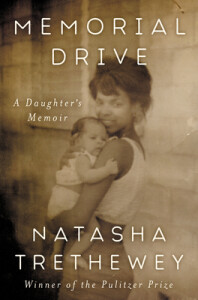
Trethewey is one of my favorite poets, so I looked forward to reading her memoir. Not needing to know anything more than the author’s name, I plunged in, only to emerge finally, astonished and awed.
With a poet’s concision and musicality, she conjures her rural Southern childhood, the move to Atlanta, and the terrible path to her mother’s murder when Trethewey was only 19. The girl’s response was to bury all memory of the years in Atlanta, the good and the bad. The woman’s self-appointed task is to unearth them and find again her lost mother.
And she does. With just a few deft strokes she summons her mother to life. I felt immediately that I knew this young woman, now divorced, leaving Mississippi for a new life with her young daughter. I felt the bond between mother and daughter, all the stronger for their separation from the close family and community back in Mississippi.
One way the author effects this revival is to include her mother’s own words, searched for and now recovered. Also, she gives us the context of the time: the early 1980s when the bitter segregation of her childhood is giving way finally to new opportunities for people of color and for women in particular, the excitement, the whiff of freedom in the air.
There’s no melodrama or sensationalism in this account. Trethewey’s voice is quiet—quiet as Black women’s voices have had to be. Yet with all that, her voice carries the emotions held in check by her composure, a tribute to the author’s exquisite use of language.
Trethewey weaves into her story the effects of being a child of a mixed marriage—her father White and her mother Black—and of growing up amid the racism of the South. She looks at how these experiences and the lasting trauma of her mother’s death have influenced her own growth as a writer.
In doing so, she has created a moving exploration of memory and of how we manage, or fail to manage, our painful past. My friend Susan Mills’s debut novel On the Wings of a Hummingbird also explores this theme: how do we an individuals, as a community recover from or at least deal with terrible suffering? So I’ve been thinking about it a lot, especially now when it seems nearly impossible to wrest reconciliation from sorrow.
In Atlanta, Trethewey and her mother lived on Memorial Drive. You can’t make these things up. This book is more than a memorial to her mother, more than a memoir, more than a masterclass in writing. It is a searing look at the lasting effects of racism and domestic abuse. And it is an invitation to think about our own losses and how they have shaped us.
Have you read a memoir that made you reflect on your own life?
